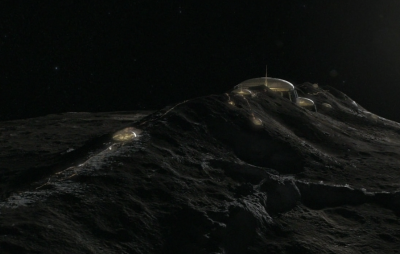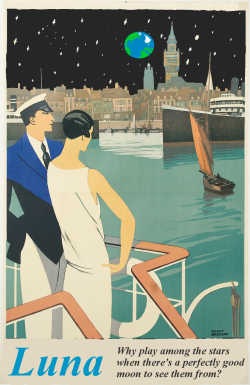Luna
Luna

Star System: Sol
Parent Planet: Earth
Capital: Harmony City
Terrestrial Population (est.): 66,674,843
Spacer Population (est.): 162,981
Noteworthy places: Lunar University of Medical Science, Interstellar Aid Corps Headquarters
General Information
Luna is the only natural satellite of Earth. It is tidally locked to its parent and makes a complete revolution every 28 standard days. It formed when a rogue planetoid collided with Earth during the early stages of its formation. The moon came together from the resultant orbital debris. Luna was the first target of spacefaring humans as they pierced the outer layers of the atmosphere. It was largely ignored until the age of FTL travel and colonization, when small colonies were established, mostly as refueling and launching posts for re-entry craft.
Luna is something of a mishmash of human society. Early in the history of mankind's colonization of outer space, Luna was developed into an off-world shipyard where vessels would be constructed and launched, drastically cutting the cost due to the lower gravity. In modern times it has developed into a busy trade hub, where traders from across the galaxy come to offload goods before they make their final trip to Earth. It is also the home of Einstein Engines, who control nearly all the shipyards and construction sites on and orbiting Luna, with Nanotrasen having an unusually smaller stake.

Cultural Information
Culturally, there is a large gulf between the lower and middle class to the notablely large amount of richer people on Luna. Many of the workers who first came to help turn smaller outposts into functioning arcologies brought with them the upbringing of their home countries, as UOE had a claim from multiple nations, namely the United States, China, Mexico, and France. Some cities show a preference to one nation generally, but almost all have some form of influence from the other's. This is especially notable in Luna's capital, Harmony City. For example, Danza de la Luna, a very popular holiday on Luna, and some would claim almost as old as some of the first outposts on it, believed to have come from the Chinese New Year, and it being adopted by other workers working with other Chinese workers. This has lead it to being less about a new year and more about the start of a new time of people working together, to build what Luna has become, and takes place every 2nd Friday of Feburary in a galactic standard year. Eclipses are also fairly popular times to celebrate as well.
The upper class, however, is comparatively an oddity, as it's culture is more revivalism of the 1920's. It was originally formed from a desire by the wealthy and officials coming to Luna in an attempt to ignore the hardships that Earth was facing, which caused many to leave it in the first place, and eventually promoted it as a novelty, to attract more wealthy and vacationers to Luna. While it's origins aren't organic, it has successfully grown to become deeply rooted in Lunan everyday life, either through entire sections of biodomes appearing to take 1920's architecture, or swing groups being extremely popular, both electro and the more classic versions of it, even occasionaly Tajara electro-swing. The image has been pressed so long onto Luna that it is not uncommon for anyone to speak closer to people of that era, even in lower classes.
Another vital part of Lunan culture is rover-racing across the surface, for crowds to safely enjoy from their biodomes and underground homes. This was also heavily influenced by 1920's revivalism, leading to their suits and rovers to be stylized to fit this image. Betting usually occurs in tandem with these races. Especially popular among highschoolers in their Senior year is to build their own (usually based off of Einstein Engines kits), and race them, usually on an indoor track of some kind, but still popular. Whether or not this accorded because of or independetly of culturally movers is unknown, but the ratings show that people love it.
Political Information
Politically in the grand scheme of things, Luna is typically a GAIA stronghold, mostly in part of the large skilled labor force present on Luna for centuries. The typically harsher outlook on xeno cultures however is softened by the overall presence of trying to draw in xenos into vacation, which are usually skrell, and this is mostly brought about by the upper class' interest in the novelty of xeno cultures, themselves tending to be GAIA as well.
Subterranean Cities
Initial exploration and colonization came with the discovery of vast subterranean lava tubes, two of which were as wide as 5km. Colonists and construction teams immediately set work in sealing and reinforcing these massive caverns, constructing subterranean towns which over the course of Luna's history developed into sprawling cities. There is a very large mining industry on Luna, with engineers and shaft miners being well paid and lucrative careers, because there are constant projects to expand and connect the subterranean cities with large and intricate mag-train subways. The trains travel at 507 km/h, allowing people to travel between even the farthest cities in mere minutes where regular travel on the surface would take many hours or even a full earth day.
Being far underground and connected to the surface via subway tunnels, escalators, and standard hallways, the Luna population is very well protected from asteroid strikes or other cosmic dangers. During solar storms or other such emergencies, emergency procedures are in place to evacuate the population underground. One famous example of this safety is during the New Phoenix disaster, where an asteroid was detected to impact in the city of New Phoenix only 7 minutes before impact. Most of the 12,000 residents were saved during the emergency evacuation, but the entire above-ground biodome was destroyed and the survivors left homeless. After this incident, all vital infrastructure (including gravity generators, atmospheric equipment, and government facilities) were moved underground.
Within the subterranean structures of lunar cities, much effort is made to maintain an illusion of space. While the majority of the lava tubes are are several kilometers in diameter, in the early days of lunar colonization, many colonists reported suffering from depression and panic attacks, as well as developing symptoms of claustrophobia. To combat this, open areas have been given powerful light sources designed to simulate natural sunlight, and residents of subterranean areas are prescribed vitamin D supplements.
Luna's Governor Kristen Anuja enjoys a moderate approval rating. She is supportive of Einstein Engines, and critical of Nanotrasen's growing involvement on Luna.
Harmony City
Harmony City was founded in 2070 by human colonists from the UOESS Pinta, in the Mare Tranquillitatis.
Notable features/places of Harmony City would include:
- AESCO-L Museum of Aeronautics and Astronautics - Established in 2135, under UNESCO, and shortly afterwards being changed to AESCO-L once the UN started to shift and change into the Sol Alliance. It is built where the Apollo 11 first landed on Luna, marking a very important step in space travel for humankind, and AESCO-L treats it as such, the flag planted by Buzz Aldrin has been placed in a small bubble, with the famous plaque still next to it, the whole museum seeming to be built around this, as the bubble is located in the central dome of the museum's miniarcology.







